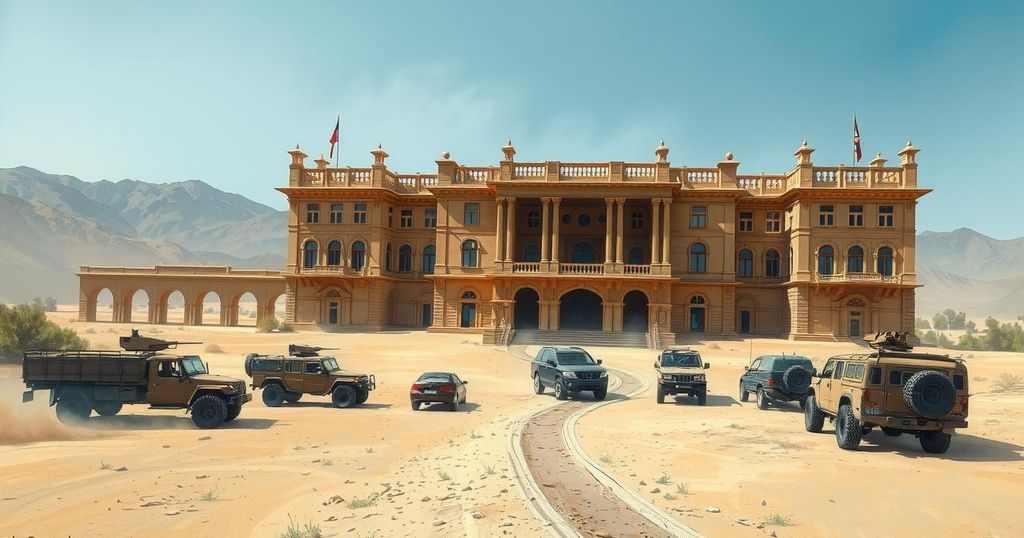Impact of Presidential Palace Recapture on Sudan War Dynamics
The Sudanese Armed Forces’ recapture of the presidential palace marks a strategic advance amid ongoing conflict with the Rapid Support Forces. While this development potentially shifts military momentum, uncertainty remains regarding a conclusive victory or peace. The humanitarian crisis in Sudan continues to deepen, with millions affected by violence and famine, raising concerns over future stability in the region.
The recent recapture of Sudan’s presidential palace by the Sudanese Armed Forces (SAF) represents a pivotal development in the ongoing war, signifying military gains after a prolonged struggle against the paramilitary Rapid Support Forces (RSF). Although the SAF had lost control of Khartoum early in the conflict, recent offensives have enabled them to reclaim significant sections of the area, positioning them favorably for further advances, though total victory remains elusive.
By securing the presidential palace, along with the historic Republican Palace, the SAF has not only regained a critical stronghold but also bolstered its narrative as legitimate rulers combating what they term a “terrorist militia.” This development reflects a strategic victory, as the army has cleared various peripheral districts in greater Khartoum and taken control of pivotal urban centers, forcing RSF combatants to withdraw from vital locations. Nonetheless, pockets of RSF resistance remain, complicating the military’s path forward.
Additionally, violent confrontations are anticipated as the SAF aims to subdue the remaining RSF units, which have demonstrated resilience despite their setbacks, evidenced by recent retaliatory strikes. Should the army establish undisputed control over Khartoum, it may significantly alter the course of the conflict, either facilitating a comprehensive military victory or solidifying the existing territorial divides between the two factions.
The RSF currently governs extensive regions, notably the Darfur area, while the military-backed administration controls the eastern and northern territories. The fraught relationship arose from their earlier collaboration and subsequent power struggles, culminating in civil conflict. Achieving dominance in Khartoum may offer the SAF leverage to confront the RSF more aggressively elsewhere, particularly in El Fasher, long held by RSF forces.
However, analysts caution against the risks of Sudan devolving into de facto partition, with both warring parties entrenched in their geographic realms of influence. The RSF has commenced establishing a parallel governmental structure in its controlled areas and remains committed to asserting its political authority despite military disadvantages.
The ongoing civil war has wrought catastrophic humanitarian consequences, with widespread displacement, severe starvation, and rampant human rights violations. According to the United Nations, the situation in Sudan has reached a humanitarian crisis of unprecedented scale, further compounded by disputes over aid access which both factions use as a tactical weapon.
While the recapture of key locations like the presidential palace might symbolically improve humanitarian conditions, the reality for Sudanese citizens remains largely unchanged. Ongoing hostility and failure to resume peace negotiations suggest continued suffering and instability is likely for the civilian population. The SAF’s momentum is noteworthy, yet experts remain skeptical that either side can achieve a decisive victory necessary to unify the nation under a stable government.
The recapture of the presidential palace marks a significant military achievement for the Sudanese Armed Forces, yet it is unlikely to lead to a comprehensive resolution of the ongoing conflict. Both factions are entrenched in hostilities, complicating peace negotiations and further exacerbating the humanitarian crisis affecting millions. Observers warn of the increasing risk of territorial partition and ongoing violence, indicating the need for urgent international involvement to address the dire situation in Sudan.
Original Source: www.bbc.com




Post Comment